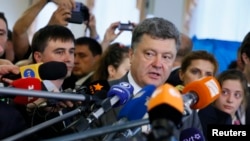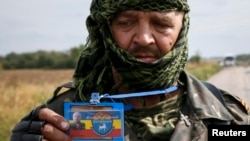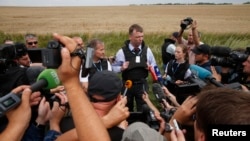A heated debate over freedom of the press versus state security erupted in Ukraine after the pro-government hacker group Myrotvorets (Peacemaker) published a list containing the personal information of thousands of journalists who had received accreditation from the separatist, Russian-backed “Donetsk People’s Republic” in eastern Ukraine.
The list, which was obtained by hackers and includes Ukrainian and foreign journalists as well as local interpreters, drivers, and camera operators, was published with an accusation that all those appearing on the list had “cooperated with terrorists.”
The backlash came soon after the leak was published. Foreign journalists and international organizations condemned the leak and the accusation of cooperation with terrorists. Some characterized the tactic as an attempt to intimidate and silence media.
The reaction in Ukraine was very mixed, however. The fact that the list became widely known after it was promoted by Ukrainian lawmaker Anton Gerashchenko gave it the appearance of having received government approval. And, despite criticism both inside and outside of Ukraine, Interior Minister Arsen Avakov defended the leak, dismissing what he called the opinions of “liberals” and “latent separatists.” Later, Ukrainian President Petro Poroshenko condemned the leak in a press conference, but urged journalists not to write “negative articles about Ukraine.”
Role of journalists
Poroshenko’s comment might sound contradictory to Western ears, but it is not unusual to those who study media in post-Soviet states.
“I think for many Ukrainians, especially for those who were born during Soviet times, there's this persistent idea that journalists are just service reporters, that all they do is take notes on what the government and elites say and then regurgitate it,” said Tanya Lokot, a Ukrainian media researcher.
“Certainly, a large part of Ukrainian news and media has been this for years,” she added.
This negative view towards journalism helps explain why some Ukrainians did not see the leaking of thousands of journalists’ personal information by hackers as an attack on freedom of the press.
“Another issue which I think is at play with Myrotvorets is this idea that during times of strife and war everyone must be a patriot - including journalists,” Lokot explained.
“So there's no room for objectivity: you must only protect Ukraine. Which obviously many journalists don't agree with, but the popular position seems to support this notion. And this is why I think the Myrotvorets thing received the reaction it did.”
Defenders of the hacker collective point out that a large number of names on the list of journalists accused of “cooperating with terrorists” by receiving accreditation from the rebel authorities work for Russian state media and other pro-Russian outlets that have been accused of waging an information war against Ukraine. On the other hand, critics of Myrotvorets note that the list contained many international correspondents from reputable media outlets, as well as their local colleagues.
Propaganda concerns
Ukrainians have reason to be concerned about Kremlin propaganda. Since 2014 Ukraine has become the primary target for Russian information warfare, which played a major role in the annexation of the Crimea and the war in the eastern part of the country. Fabricated stories were so numerous that some activists founded StopFake.org, a website entirely dedicated to debunking phony stories about Ukraine.
Yevhen Fedchenko is the director of Kyiv’s Mohyla School of Journalism and a co-founder of StopFake.
“We see our mission to raise the level of awareness about Russian propaganda, how systematic it is, how [the] Russian government is using it to influence [the] decision-making process in countries across the whole Europe,” he told VOA. “Second, [StopFake] became [an] enormous searchable archive of propaganda that can be used for research as well as for policy-making towards Russia. Third, this is a part of [a] larger campaign to strengthen fact-checking capacities of journalism and improve media literacy among audiences,” Fedchenko said.
Defending values
While StopFake typically has its plate full with pro-Russian stories, it also finds time to debunk fake stories from the Ukrainian press, indicating that the problems with journalism in Ukraine are by no means limited to pro-Russian propaganda.
“And that explains why myself and [the] Mohyla School of Journalism are behind this project - we really want to defend journalism against influences of propaganda that corrupt journalism, making people distrustful of media and alienated from active participation in the political process,” Fedchenko said.
In addition to resources like StopFake, other grassroots alternative media projects have begun to appear as the topic of media awareness gains more traction in Ukraine. While some progress has been made, much work remains, according to Lokot.
“I think what needs to be done is a strategy for these new kinds of public service media beyond 'fighting Russian propaganda' - that is important, but there is other stuff beyond it,” she said. “And they have to start thinking about it now. What is their mission, their strategy once Russian propaganda becomes irrelevant? Is it media literacy? Is it accountability of local officials? That, I think, needs to be made clearer.”
Jim Kovpak is an American writer in Moscow who runs the Russia Without BS blog.






